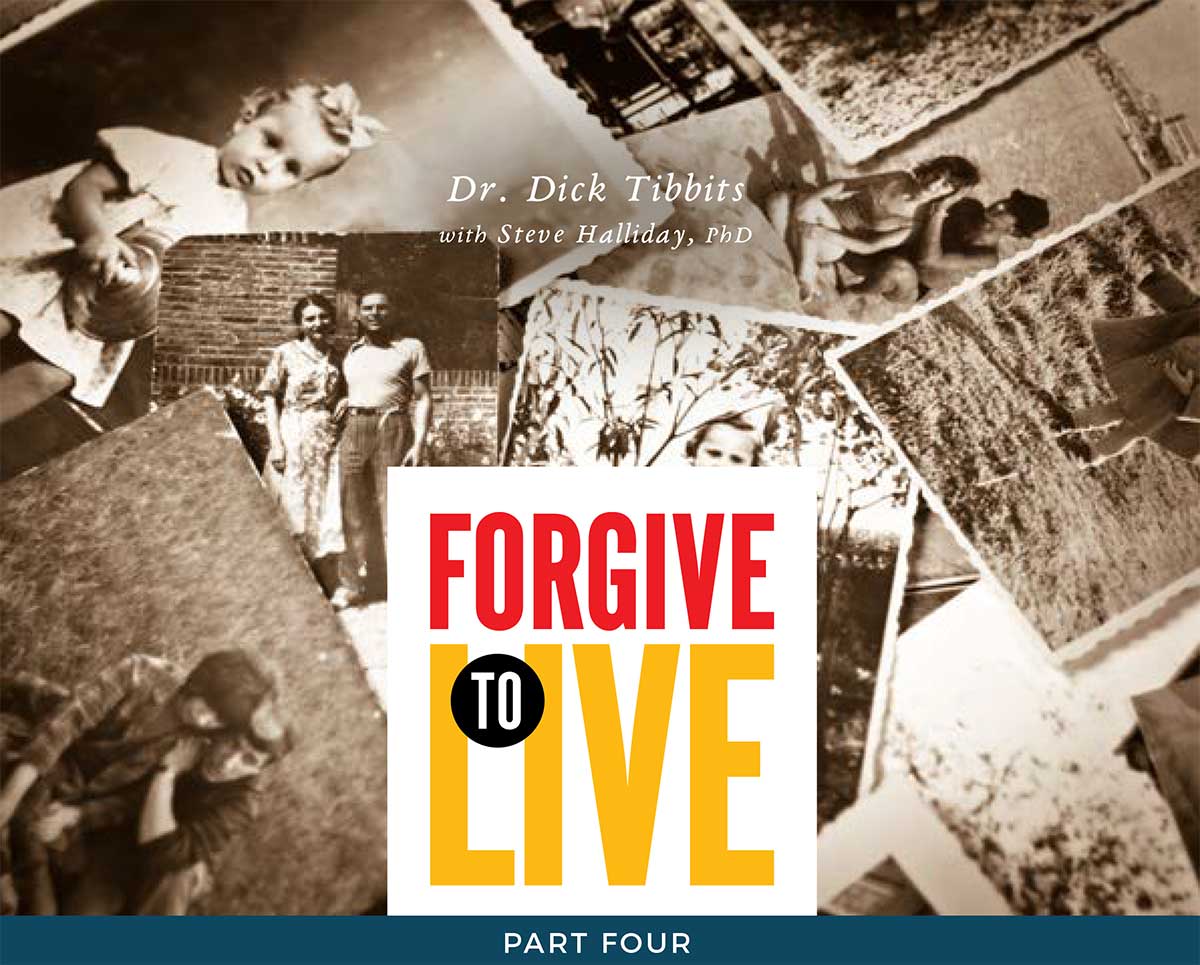
Reframing the Past
The past exists only in your memory
For your Convenience
To participate in this six part series on Forgiveness you can either watch the video below, read the excellent content on this page, or do both. We hope this journey is as rewarding for you as it has been for us.
– Hope Channel –
Sally’s Story
Sally grew up in a good home, and when she married, she tried to be the perfect wife. But it seemed as if nothing she did was good enough. Jeff ignored her, and the two of them seemed to live in separate worlds.
One day when Sally returned earlier than expected from visiting her mother, she found another woman in her home with Jeff. Furious, Sally kicked her cheating husband out of the house.
Sally had no idea how to deal with this loss. For years, her life revolved around that terrible evening and what Jeff had put her through. So, rather than moving on with her life, she took every opportunity to tell all her friends what a terrible person Jeff was—that is, the few friends she had left. People who knew Sally tried to avoid her and her bitterness, as if she were wearing a necklace of the most potent garlic. And the temporary satisfaction Sally obtained from talking about no-good Jeff provided little relief from the misery of her wounded existence.
Meanwhile, Jeff had gone on with his life, remarried, and of course had no interest in staying in touch with Sally. This further infuriated Sally, so she would occasionally send Jeff a letter letting him (and anyone else who might read the letter) know what a terrible man he was. After a time, the letters started coming back with the notation “Return to sender. Addressee unknown.”
Tragically, Sally remained imprisoned by her anger and totally unaware that she was choosing to remain trapped by her miserable story.

What You Need To Know
Every time I tell people they can change the story of their past (their grievance story), I can anticipate this reaction: “What do you mean, change my story? That is impossible! I know exactly what happened. Are you saying that I should tell myself a lie in order to forgive? Listen, I can’t change the facts; a fact is a fact.”
It all depends on how we look at things, and not on how things are in themselves.
– Carl Jung
Let me assert as plainly as I can that forgiveness does not change the facts, nor does it want to. It simply changes my perspective with regard to the facts.
Remember that the goal of forgiveness is not to forget, but to remember in a different way. I have learned that perceptions are reality, often even more than reality itself. So the good news is that we can change our perceptions. The way we change our perceptions is explained through a process called reframing. Reframing does not mean changing the facts; it means changing the focus of your attention from a single event to the larger picture, thus changing your perception of the facts.
Your view of life depends on your point of view or your frame of reference. You literally shape how you see others and the world in which you live by your frame of reference. You have heard it said that some people see life through rose-colored glasses. That is a way of expressing the fact that life is colored by your point of view.

Prosecution and Defence
When I served on a jury, I felt amazed at how differently the prosecuting lawyer and defense lawyer expressed what had happened. While they both agreed on the facts, we as a jury heard two very different stories. Depending on which lawyer you believed, you could come to the opposite conclusion, based on the same facts.
Given that I view life from my frame of reference, picture the process of framing like this: When you look at a painting on the wall, what you see is shaped by the frame that surrounds the picture. The artist can focus you on a single flower, or he can open the world for you to see the whole forest. A frame around a picture helps to focus your attention on what the artist believes is most important in that picture.
Forgiveness does not change what happened; forgiveness changes how I see things and what they mean to me.
We do the same thing when we frame a story. You can focus on a single event or put the same story in a larger context for a totally different point of view. When someone has hurt us, we tend to frame the picture as small as possible. All we can see is the single event that caused us so much pain. Your whole world can be framed by that single event. When you frame something, you pick those facts that reinforce your point of view and then fill your picture with all the wrong that person has ever done to you.

You may have observed this happening in real time when someone feels upset with you. They think of everything you have ever done wrong in the past and bring it up in the present to paint a terrible picture of how they see you. They selectively remember, for it is impossible to remember everything that has ever happened. When we get upset, we select only the bad things to remember. In effect, we choose our memories.
Different Perspectives
Small-frame people tend to focus almost exclusively on the faults of others, while large-frame people see the big picture. Let me illustrate this from my own experience. As a hospital administrator, I would often have to resolve conflicts, choosing between what was in the best interest of the hospital and what was in the best interest of the physician treating the patient. We could argue endlessly about the correct course of action, but we would be hard pressed to come to a conclusion, because we both viewed the solution for our respective positions and accompanying incentives. The only effective way to reframe the discussion was to take it up to the next higher level.
Was there a principle that stood above our current discussion that we could agree on? Most often, that would be the purpose of our respective professions which, in this instance, was to care for the patient. From that higher level, we could return to the problem at hand and ask the question, “What solution will best serve the patient?” If we were honest about this, we often came to the right answer. This is a practical way of reframing by enlarging the frame of reference.

When you focus exclusively on the hurt the other person caused you, you easily frame the picture with one thing: how terrible the other person is. You then share your frame of reference with everyone you can so they, too, will see that person exactly as you do. The problem with this is that while the facts are true, the frame of reference is distorted. It shows only part of the picture. Forgiving is simply easier when you have the whole picture, or at least a larger piece of the picture.
One way to demonstrate this truth is to consider a person you currently do not like. This same person was at one time your good friend or even someone you fell in love with. When you focused exclusively on the person’s good points, you saw only good in that person. Now that he or she has hurt you, you focus exclusively on the faults, and you no longer like the individual. This is how the same person in your grievance story who was once your good friend has now become your worst enemy. It also explains how your worst enemy can be someone else’s best friend. We all see what we look for.

Finding What You Are Looking For
How you see a person will be determined by what you look for in that person. What you see is what you frame in your picture. The victim and the offender will frame the same event in two different ways. Victims will frame their story as if the offense is still continuing, whereas the offender will describe the event as over and done with. The victim will maximize the negative impact of the unwanted event, whereas the offender will minimize the significance of the event. These distortions will produce two entirely different stories. Each story is framed from a particular point of view.
For I have also learned from experience that the greater part of our happiness or misery depends upon our disposition and not upon our circumstances.
– Martha Washington
By having a more complete picture, you can change your focus from the problem toward a possible solution. Through the process of reframing, we literally change our past. Forgiveness changes your past by changing how you recall your past.

Keep in mind that reframing is not a single act that you do only one time. It is a process of continual reframing. If reframing the story seven times does not work, be prepared to reframe your story seventy times seven. When the story you now tell yourself becomes sufficiently altered from the story you always told yourself, then you have in effect reframed your past. This profound truth is based on the fact that your past exists only in your mind’s memory. With enough alterations, you will have a completely different story that will affect you in a totally different way. The facts will not change, but your perspective does. Practice putting your past in the past, where it belongs, so you can live a different life in the present. In this way, forgiveness heals the hurt, rather than hiding it.
And “letting go” means letting go of your old grievance story and replacing it with a new, more accurate story. You don’t lie to yourself; you don’t pretend that the event wasn’t important or didn’t hurt. But reframing your story by placing it in a better perspective will take away its power over your life. By making it more accurate, you will lessen its ability to continue to hurt you.
With forgiveness, your life is no longer defined by your past.
As you begin the process of reframing your grievance story, keep in mind three crucial truths that underlie the possibility of forgiveness:
* You cannot change the past.
* You cannot change the person who hurt you.
* But you can change yourself.

Tapping into the Power of Forgiveness
You earlier identified your grievance story. Now I want you to assess how that story is affecting your life today. Do you suffer any physical symptoms? Do you get upset or depressed after thinking about it? Do you blame God for allowing this terrible thing to happen to you? Finally, ask yourself if retaining the story is worth the price you are paying. If you are still paying the price for what someone else has done to you, it may be time for you to forgive.
Practice reframing your story one detail at a time. With each reframing, your picture will change. Be patient with yourself and do not get discouraged if you slip from time to time. Change is not linear but circular; with each advance will be a retreat. The goal is to keep your eye on the desired end point, not your current situation. Are things getting better over time? Remember, a trend is your friend, so embrace the journey and don’t get overly concerned with day-to-day variations. Be persistent and you will make progress. With time and practice, your story will change sufficiently to enable you to move on. The key is to keep placing yourself in the driver’s seat so that you become the victor over the situation rather than the victim.

Forgiveness is the way to work through your problems rather than to walk around them. Forgiveness heals the hurt rather than hiding it.
Below are the five steps involved in reframing a grievance story. Each step is important and is best tackled in the order given.
Step #1 – Focus on what’s true from both points of view.
You have a particular perspective on the painful incident that prompted your grievance story, but so does the person in your story whom you consider the offender! Rarely is one party completely at fault and the other totally innocent. I have never seen a pancake so thin it does not have two sides. Part of reframing asks you to look for truth from all relevant points of view.
Step #2 – Develop empathy for the person who hurt you.
Try to see the other person as a real human being, not as a demon who is completely and irredeemably evil. To empathize means that you try to understand what might have motivated the behavior you found so hurtful.
This is not easy work and you may have to wait some time before you are emotionally able to do this; but reframing your story is essential if you are to move on.

Step #3 – Identify the wrongs you yourself have committed that need to be forgiven.
All of us need forgiveness, and that includes you. Once you realize that you have done things that require forgiveness and that you have received the forgiveness you needed, you will most likely be much more open to forgiving the person who hurt you. When you develop an attitude of humility—“There but for the grace of God go I”—you find it much easier to forgive people who hurt you.
Step #4 – Revise your story so that it more accurately reflects reality.
Take some time now to dissect your original grievance story. Identify the elements of your story that needed a small frame in order to appear true. Then make your frame as large as you can and try to see the hurtful incident as one small part of a bigger picture. Your goal is to make your story more comprehensive and therefore more accurate.
Step #5 – Imagine your desired outcome and make adjustments toward that end.
Forgiveness looks ahead as well as behind. In looking ahead, it frees you to picture the kind of future that will bring you the greatest amount of satisfaction and fulfillment. Forgiveness releases you from the shackles of a painful past so that you can take specific, appropriate steps toward achieving the future you desire.
Realize that forgiveness takes time; it is almost never a one-time event. Rarely can someone in a single instant forgive so completely and comprehensively that those old, negative thoughts never resurface. It may take a while for you to “let go” and thus experience all the tremendous benefits of forgiveness. It takes practice—so start practicing today.









